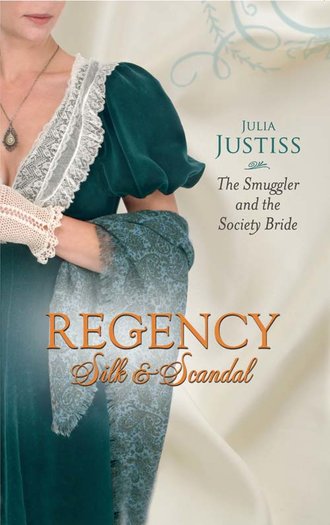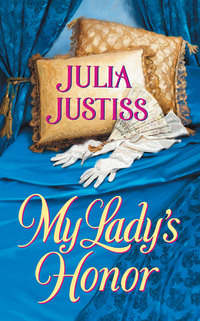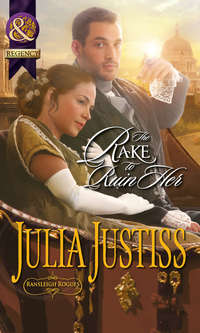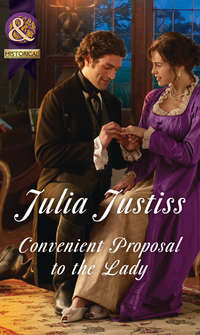
Полная версия
The Smuggler and the Society Bride
‘Oh, course not, miss,’ the maid replied hastily, a telltale blush colouring her cheeks. ‘I, um, heard all about it from Alan the footman, who met some fishermen whilst walking back from the village. But you must take care, miss! The water in the cove looks peaceful, but there be a powerful current where it runs between them rocks back out to sea. If you’d gone out much farther, you mighta been swept away!’
In the agitation of the moment, struggling in her heavy, wet clothing and desperate to reach the drowning man, Honoria hadn’t particularly noticed. Now that she thought about it, she did recall how much stronger the outward tug had become as she reached deeper water. ‘Luckily I didn’t need to go out farther.’
‘Indeed, miss. But, oh, wasn’t he wonderful! Leaping off the rocks and swimming across the strongest part of undertow to haul out that worthless revenue agent! I swear, my heart was in my throat, wondering if the both of them would be sucked back out to sea,’ the maid exclaimed, obviously forgetting her contention that she’d not personally witnessed the drama.
Amused, Honoria tried to resist the curiosity pulling at her as insistently as that treacherous current. Losing that struggle, she asked casually, ‘Who was the young man who made the rescue?’
The maid stared at her. ‘You don’t know? Why, ’twas the Hawk! My brother Dickin, who’s a dab hand of a captain himself, says he’s the best, most fearless mariner he’s ever seen! Eyes like a cat, he has, able to navigate despite tides and rough sea even on the blackest night. Gabriel Hawksworth’s his real name. He’s only been captain of the Flying Gull for a few months, but folks hereabouts already dubbed him Hawk for the way he can steer his cutter sharp into land and back out again, like some bird swooping in to seize his prey.’
‘He’s not local, then?’ Honoria asked.
‘No, miss. Not rightly sure where he hails from, though with that hint of blarney in his voice, I’d guess he’s Irish.’
‘Do the Irish also fish these waters?’ she asked. Though the Hawk seemed too confident and commanding a man to have spent his life on a fishing boat.
‘Don’t know what he done before the war. He was an Army mate of Dickin’s. While with Wellington’s forces in Spain, far from the sea, they used to talk about sailing, my brother told me. Even took a boat out together a few times when they got to Lisbon, and Dickin said he’d never met a man who could handle a small craft better. When the former captain of the Gull was injured, Dickin asked the Hawk to come sail her.’
An Army man. That would explain his decisive air of command. Her brother Hal possessed the quality in abundance. ‘If he is so fond of sea, I wonder he didn’t end up in the Navy.’
‘Don’t know about the Hawk, but Dickin had no wish to be gone for months deep-water sailing. Said if the navvies ever found out how well he could handle a tiller, he’d be gang-pressed onto a frigate and never see land again! So when the Army recruiters come through, he jumped up to volunteer. Didn’t mind doing his part to put Boney away, but wanted to be able to come home afterward, take care of Ma and us kids and tend the family business.’
‘The family business being free-trading?’ Honoria asked.
Tamsyn blushed again. ‘Helping Pa run the inn, mostly, along with some fishing, miss. As for anything else, as folks around here will tell you, ’tis best if you don’t look too close nor ask too many questions. In general, the revenuers leave everyone alone, long as old Mr Marshall gets his cut regular. That man who ran his skiff on the rocks today was a new man.’
‘Who wouldn’t be around to look closely or ask questions any longer, if Mr Hawksworth hadn’t intervened.’
‘True, but the Hawk being such a good captain, I don’t think anyone hereabouts will hold it against him.’
Before Honoria could exclaim about someone being censored for saving, rather than taking, a life, Tamsyn paused to utter a sigh. ‘And he’s as handsome as he is skilful! So tall, with them big broad shoulders and eyes so blue, you’d think they held the whole sky inside.’
‘Why, Tamsyn, you’re quite the poet!’
The maid’s blush deepened. ‘They are ever so blue. All the maids—not just here, but from Padstow to Polperro, Dickin says!—have set their caps for him. Though as yet, he’s not shown a partiality for any particular lass,’ she added, her expression brightening.
So Tamsyn was among those smitten by the handsome captain. As for singling out one particular lady among the many apparently vying for his attention, Honoria suspected dryly that Mr Hawksworth wasn’t in any hurry to make a choice.
Replaying in her mind’s eye that bold dive into the swift-moving water and the tricky swim towing the struggling mariner, she had to agree that in this instance, he had lived up to the dashing image Tamsyn had described.
Recalling the intimate lilt of his voice, the admittedly intense blue of his gaze, she felt another quiver in the pit of her stomach. She sighed, unable to help sympathizing a bit with all the infatuated maidens.
Not that she had any intention of following their lead. Besides, except for that chance encounter at the beach, it was highly unlikely that the niece of Miss Foxe of Foxeden Manor would be rubbing shoulders with the captain of a smuggling vessel, no matter how locally celebrated.
As she pulled her chemise over her blessedly warm, clean, naked body, for an instant she felt again the brigand’s intense blue-eyed gaze, unabashedly staring at her through that all-too-thin drape of wet linen.
A little sizzle hissed and burned across her skin.
Resolutely, she shook off the sensation. Dismissing any further thoughts of the rogue who’d inspired it, she let Tamsyn lace her stays.
Chapter Three
Two days later, Honoria accompanied Aunt Foxe to church in Sennlack. A local curate normally served the small parish, but occasionally the bishop from Exeter came to conduct the services. In honour of that visiting dignitary, an acquaintance of many years, Miss Foxe had elected to drive to town rather than remain at home to conduct her own private devotions, as she had the previous Sundays since Honoria’s arrival.
Having been through the village only when her carriage halted at the Gull’s Roost for directions to Foxeden Manor the day of her arrival, Honoria was looking forward to visiting the town and viewing the inside of the rustic stone church. Except for her walks along the cliffs, she’d not left the manor’s grounds since her arrival.
After the service, the congregation filed out, shaking hands with the rector and the bishop before they departed or stood in small groups chatting. Honoria recognized the man currently speaking with the vicar as the innkeeper from whom John Coachman had obtained directions to Foxeden—the man Tamsyn later identified as her father. The senior Mr Kessel was flanked by two young men who bore him a striking resemblance, one of whom must be Tamsyn’s fishing boat captain brother, Dickin.
The curate laughed and joked with the men, much friendlier than Honoria would have expected a clergyman would be with individuals whose true occupation, she suspected, involved activities of more dubious legality than innkeeping or fishery.
‘I wonder that the vicar is on such good terms with free-traders,’ she murmured to her aunt as they made their way down the aisle.
Miss Foxe laughed. ‘A Welshman likes his brandy and spirits as well as the next man. You won’t find any hereabouts who don’t do business with free-traders. I’ve even heard there’s a smuggler’s tunnel that leads into the basement under the sacristy of this church.’
‘Surely not!’ Honoria replied, properly shocked—as, from the twinkle in her aunt’s eye, that lady had meant her to be. Was it true? she wondered.
They reached the vestibule, where her aunt’s attention was immediately claimed by the visiting bishop. Realizing that she would soon be introduced to him and probably a number of members of the local community, Honoria’s initial enthusiasm for the excursion vanished. Hoping to postpone the moment as long as possible, she turned aside, ostensibly to allow her aunt a moment of private conversation.
Remote as Sennlack—and even Exeter—were from London, she suddenly felt sick with apprehension that the bishop might, upon being given her name, have heard about her disgrace.
Her anxiety over how to counter that possibility was interrupted by a little girl tugging at her sleeve. Having claimed her attention, the child smiled, bobbed a curtsy and held out a handful of flowers that wafted up to her the delicious odour of primroses.
‘For me?’ Honoria asked.
The girl nodded. Thin, with ragged blonde hair and dressed in a worn, simple gown, she appeared to be about ten years old.
As Honoria looked from the flowers to the child, she noticed with a small shock that while the girl’s one blue eye stared directly at her, the other, grey in hue, seemed to be inspecting the distance beyond. The mismatched colour and wandering eye gave the child an unsettling, other-worldly look.
‘How very kind of you…’ As she paused, waiting for the child to supply her name, a woman hurried over.
‘Sorry, miss, I didn’t mean for her to bother you! Come with Mama, now, Eva,’ the woman coaxed.
‘She’s no bother. It was sweet of her to give me flowers,’ Honoria replied.
Pulling free of her mother, the girl wiggled her fingers like a flowing sea, then made a dog-paddling motion.
‘She brought them because she thought you were so brave, trying to help the man who looked to drown,’ the mother explained.
Giving Honoria a lopsided smile as slightly off-kilter as her eyes, the girl nodded.
Honoria felt both charmed and embarrassed. ‘I’m not brave at all, but thank you, Eva. The primroses are lovely!’
The little girl patted the skirt of Honoria’s gown and made another gesture, to which her mother nodded.
‘She thinks you are lovely, too, miss.’
When the mother’s fond smile abruptly vanished, Honoria glanced in the direction of the woman’s gaze. One of the innkeeper’s sons was bearing down on them, an angry scowl on his face.
‘I thought you’d been warned not to bring her here,’ he snarled at the mother.
‘Sorry, Mr John,’ the woman said, curtsying as she grabbed the girl’s hand. ‘We was just going.’
Seeming content now that her errand was discharged, the child let her mother lead her off.
Honoria watched them go, frowning.
The innkeeper’s son shook his head. ‘Not right for her to bring that halfwit here among normal people. Bad luck, it is.’
‘She didn’t seem half-witted to me,’ Honoria retorted, her temper stirred by the man’s harshness to the child.
He gave her a dismissive look. ‘Meaning no disrespect, miss, but you’re a stranger here, and probably ought not to talk on things you don’t know nothing about.’
Truly angry now, Honoria was about to return a sharp remark when she heard her aunt’s voice from just behind her. ‘Ah, here you are, my dear. Come, let me present you to my good friend, His Eminence Bishop Richards, and the vicar, Father Gryffd.’
Dread tightened her chest as Honoria turned to face them. When Miss Foxe continued, ‘Gentlemen, my kinswoman—’ she found herself blurting ‘—Miss Foxe. Miss Marie Foxe,’ she added, in deference to her aunt as an elder Miss Foxe.
As ashamed as she might be of the desperation that had produced the lie, her feelings of relief were stronger. Until she figured out what to do with her life, she’d just as lief the bishop—and the rest of Sennlack—were not aware of her true surname, in case some word of the scandal made it here from London. And with the nature of that scandal making the name Honoria sound too much like mockery to her ears, she’d might as well make the falsehood complete by using a middle name.
To Honoria’s relief, after only a slight rise of her eyebrows, Aunt Foxe fell in with the deception. ‘My niece is presently on an…extended visit.’
‘Welcome, Miss Foxe,’ the bishop said. ‘Sennlack may be only a small village, but I’m sure your aunt will make you quite comfortable. The views from the coastal walk are breathtaking, her gardens lovely, and Foxeden Manor boasts a fine library.’
‘Thank you, sir. I’m sure my stay will be most enjoyable.’
‘Shall we tempt you to Exeter for the summer festival, Miss Foxe?’ the bishop addressed her aunt. As the two began discussing this event, Honoria turned her attention to the vicar.
‘Father, who is that little girl walking off with her mother?’ she asked, pointing down the lane.
As if somehow knowing she was being discussed, the child paused at the bend in the road to look back and wave. With a defiant glance in the direction of the innkeeper’s son, Honoria waved back.
‘Eva Steavens,’ the vicar replied. ‘And her mother, Mrs Steavens, a recent widow. Her husband and the child’s father, a fisherman, was lost at sea last winter.’
‘Poor child—and poor wife,’ Honoria murmured. ‘Does the girl never speak?’
‘Not that I know,’ Father Gryffd replied.
‘That still doesn’t make her a halfwit—no matter what some people might think,’ Honoria asserted.
‘No, indeed,’ the vicar agreed. ‘But many of the folk hereabouts are superstitious. It’s her eyes, I suppose, and that crooked smile. Fearing what they do not understand, some think it the devil’s mark and avoid her. Especially…’ he hesitated, as if searching for the correct word ‘…watermen like John Kessel, who shooed her away. It seems she gave a pretty rock or some such trifle to a friend of his, the captain of one of the local, um, fishing boats, just before he set off on a voyage. There was a storm; the ship was lost at sea with all hands. Kessel believes she possesses the evil eye and brought his friend ill luck.’
‘That’s ridiculous,’ Honoria said flatly.
The vicar nodded. ‘Indeed, but the sea is a hard mistress. One can understand that those who ply her depths would wish to avoid anything they think might increase her dangers.’
Unable to disagree with that argument, Honoria said instead, ‘Is the child a halfwit?’
‘’Tis difficult to know for sure when one is unable to speak with her. But she appears intelligent. You must have noticed the language of gestures she has developed to communicate with her mother.’
Her newly-acquired sympathy for the innocent ignited on the girl’s behalf. ‘But it’s so unfair! ’Tis no fault of hers that she entered life with mismatched eyes and a crooked smile.’
‘It is indeed wrong for innocents to suffer for the mistaken perceptions of the world,’ Aunt Foxe said, rejoining their conversation as the bishop’s attention was claimed by another parishioner. ‘But, alas, ’tis often the case.’
Her kind eyes and the look she directed to Honoria were so filled with sympathy, Honoria’s own eyes pricked with tears.
‘One waits in hope for a just God to right matters in the end,’ the vicar said.
‘Amen to that,’ Aunt Foxe agreed.
Honoria had nearly regained her composure when a velvet-timbred, lilting voice emanating from just behind made her jump.
‘Father Gryffd, Miss Foxe, good day. I heard we had a new visitor at services.’
A wave of sensation rippled across her skin. Honoria turned toward the voice that, although she had heard it only once before, already seemed familiar. Standing before her, a smile on his handsome face, was the rescuer from the beach.
Something about that smile made her stomach go soft as blancmange while little ripples darted across her nerves. Before she could figure out why a man’s expression could have elicited such an absurd reaction, the man himself bowed to her aunt. ‘Miss Foxe, might I have the temerity to beg an introduction?’
Her aunt hesitated. Honoria held her breath, wondering how that lady would respond. A smuggler was not a fit person for Lady Honoria Carlow to know, but snubbing a renowned local personage in so small a village hardly seemed warranted—especially on behalf of a mere Miss Foxe whose aunt was apparently on familiar terms with him.
Obviously drawing the same conclusion, with an amused smile, her aunt nodded. ‘My dear, allow me to introduce Mr Gabriel Hawksworth, a…mariner lately come to our shores. Mr Hawksworth, my niece, ah, Miss Marie Foxe.’
‘A breathtaking addition to our local congregation, ma’am. I’ve heard Miss Marie is an admirer of gardens. Would you permit me the further liberty of escorting your niece to view the roses in the churchyard? They are just coming into bloom.’
Honoria nearly sputtered with indignation as her aunt weighed that request. Had the man in question been an eligible gentleman of rank, the inquiry would have been bold enough, but for an out-and-out rogue to solicit the company of an earl’s daughter was audacious beyond belief!
Perhaps it was her certain knowledge that the Carlow men would go into fits, were they to know Honoria was strolling about with a free-trader, but Aunt Foxe nodded her head.
‘I don’t suppose you can involve her in too much mischief whilst walking about the churchyard in plain view, Mr Hawks-worth, but I do count on you to exhibit your most gentlemanly behaviour. My dear, make the most of this opportunity to become acquainted with a local legend.’
The brigand bowed low. ‘I am deeply in your debt, ma’am.’
‘See that you remember that the next time you price your cargo,’ her aunt replied.
Beginning to believe her aunt nearly as much a rogue as the man into whose charge she was being given, before she could think how to protest, with an elaborate bow, Mr Hawksworth claimed her hand and nudged her into motion.
Any thoughts of refusal were scattered to the wind by the little shock that leapt through her as he took her hand. Though after that jolt, her mind remained indignant over the Hawk’s effrontery, her treacherous feet followed his lead quite docilely—a reaction which only increased her irritation.
‘Sir, this is an abduction,’ she said in an undertone.
‘Hardly that! Not when I’ve agreed to be upon my best behaviour. I shall even refrain from detailing all the possible mischief one could get up to in a garden.’
His teasing remark doused her heated irritation as effectively as a cold sea wave. She knew all too well what mischief could occur in a garden. Because of it, she was no longer Lady Honoria, sought-after maiden of quality allowed to maintain exacting standards about whom she would and would not grace with her company.
Still, though in truth she might now rate even lower than a plain ‘Miss Foxe,’ that didn’t mean she had to swell this man’s vanity by swooning at his feet like all the other village girls—no matter how eagerly her senses responded to him.
The best way to deal with the stranger, she decided, was to show him how unimpressed she was by his charm and dashing manner. A man who had every maid from Padstow to Polperro sighing over him could probably use a good lesson in humility.
‘For that, you would need a willing partner,’ she replied at last.
He paused in mid-stride and looked at her, one eyebrow quirked. ‘And you think you wouldn’t be?’
As he bent upon her the intensive gaze she remembered so well from the beach, a warm melting feeling expanded in the pit of her stomach. ‘Certainly not,’ she replied in the most disdainful voice she could summon.
He shook his head disbelievingly. ‘I thought you had a fondness for mariners—or so it seemed when I saw you on the beach at Sennlack Cove. Most…intriguingly dressed, I might add,’ he said, sweeping his gaze from her legs to her belly, then letting it linger at the apex of her thighs.
Honoria felt her face burn as other parts of her tingled. ‘A gentleman would have forgotten my…unsuitable attire.’
He laughed, a warm, rich sound that was as engaging as his smile—drat him. ‘I thought we’d already established I’m no gentleman! But unsuitable as that might make me to accompany you, I did feel compelled to seek you out. A genteel young lady who knows how to swim is uncommon enough. ’Tis even more astounding to find one who was prepared to jeopardize her safety—and dignity—by plunging in to rescue a stranger.’
His unexpected admiration, as much as his sudden dropping of the overly gallant tone and manner, was making it difficult for her to maintain her haughteur. ‘I would hope any good Christian would do the same,’ she said.
‘You have a higher opinion of Christians than I. So why are you so disapproving of me?’
‘Of a smuggler and a law breaker?’ Who is way too attractive for my comfort, she added silently. ‘I would have deemed you intelligent enough to have already deduced the reason,’ she told him, deliberately using the most formal wording she could summon to display a superior education and breeding that was meant to put him in his place.
Instead, he laughed out loud. ‘Miss Foxe, you are a newcomer! If not upon that charge, then certainly upon aiding and abetting, you could convict half the congregation! Do you not remember seeing some of them among the group on the beach?’
A grudging honesty forced her to admit she’d noted that fact during services. ‘It’s a dangerous risk they all run—and for what, some bits of lace?’
Once again, he paused. After looking her up and down—setting her nerves humming wherever his gaze touched—he remarked, ‘That’s quite a disapproving tone for one who, if my eye for feminine finery remains true, is wearing no small bit of lace herself.’
Aghast, Honoria looked down at her pelisse. Warmer and heavier than those she’d brought from London, it was borrowed from her aunt, who was of almost the same size—and boasted a fine trimming of lace at the collar and cuffs.
With chagrin, she realized he was probably right—which made her almost as angry as the realization that, hard as she tried to will it otherwise, she was not immune to the appeal of that blue-eyed gaze or self-assured charm.
‘I shall take care not to do so in future,’ she said stiffly. ‘I don’t wish to enrich common brigands.’
To her further annoyance, his grin only widened. ‘Ah, Miss Foxe, we are not at all common! Those who follow the sea are a hardy lot, braving wind, tide and storm, and those who do so while eluding pursuit are more resourceful still. I don’t wish to sound boastful, but ’tis a fact that quite a few ladies hereabouts admire us!’
‘Ladies?’ she echoed disbelievingly. ‘Now I know you are joking.’
‘Indeed, I am not!’ he protested. ‘Have you not heard of the landlady in West Looe who, when the preventives came to her establishment searching for free-trader cargo, concealed a keg beneath her skirts and sat calmly knitting until the agents departed? Indeed, even the customs collector of Penzance often calls fellows in the trade “honest men in all their dealings.”’
Honoria studied his smiling face, trying to decide whether he could be telling the truth. ‘I believe you are trying to cozen me,’ she said at last.
‘Absolutely not!’ he affirmed. ‘Ask anyone. Free-traders are considered quite respectable fellows hereabouts. It’s even said that the church spire at St Christopher’s—’ he gestured upward to the building she’d lately occupied ‘—had its tower built by special contribution from the local landowners, to make it high enough to serve as a navigation landmark for…mariners.’
‘The church tower?’ she exclaimed. ‘Now I know you are bamming me!’
‘Since the days of running wool to Flanders, smuggling has been a part of life here. Nearly everyone is involved, either as provider or customer, from the miners who buy the cheapest spirits to the rich landowners quaffing expensive brandy. Even your aunt.’
Though she suspected as much, Honoria still didn’t wish to admit it. ‘Surely not my Aunt Foxe!’
The brigand chuckled. ‘Do you think the local dressmaker provided the lace that trims those sleeves? Or the shop in town, the clarets that grace her dinner table—or the cognac that warms her coachman on a cold evening? If the Crown truly wished to bring illegal trade to a stop, they would abolish the tariffs.’









